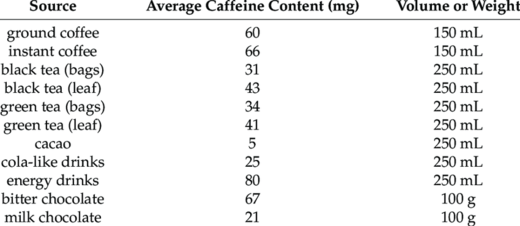Caffeine
From Wikiwel
See also :
Other Names: 1,3,7-trimethylxanthine, 1,3,7-triméthylxanthine, Anhydrous Caffeine, Cafeina, Caféine, Caféine Anhydre, Caféine Benzodate de Sodium, Caffeine Sodium Benzoate, Caffeine Anhydrous, Caffeine Citrate, Caffeinum, Citrate de Caféine, Citrated Caffeine, Methylxanthine, Méthylxanthine, Trimethylxanthine, Triméthylxanthine.
Special Precautions of Caffeine
- Caffeine can cause insomnia, nervousness and restlessness, stomach irritation, nausea and vomiting, increased heart rate and respiration, and other side effects. Caffeine can make sleep disorders in patients with acquired immunodeficiency syndrome (AIDS) worse. Larger doses might cause headache, anxiety, agitation, chest pain, and ringing in the ears.
- Headache : caffeine does not directly cause headache, too much of the substance can trigger “caffeine rebound.” A caffeine rebound headache occurs from withdrawals of caffeine after a sufferer continually consumes too much of it. Though the physical side effects can be severe, only 2% of the population suffers from caffeine rebound.
- Large doses may be UNSAFE and can cause irregular heartbeats and even death.
- Pregnancy and breast-feeding: Caffeine is POSSIBLY SAFE in pregnant or breast-feeding women in daily amounts of less than 200 mg. This is about the amount in 1-2 cups of coffee. Consuming larger amounts during pregnancy might increase the chance of miscarriage and other problems. Caffeine passes into breast milk, so nursing mothers should closely monitor caffeine intake to make sure it is on the low side. Caffeine in large amounts is POSSIBLY UNSAFE during breast-feeding. Caffeine can cause sleep disturbances, irritability, and increased bowel activity in breast-fed infants.
- Anxiety disorders: Caffeine might make these conditions worse. Use with care.
- Bipolar disorder: Too much caffeine might make this condition worse. In one case, a 36-year-old man with controlled bipolar disorder was hospitalized with symptoms of mania after drinking several cans of an energy drink containing caffeine, taurine, inositol, and other ingredients (Red Bull Energy Drink) over a period of 4 days. Use caffeine with care and in low amounts if you have bipolar disorder.
- Bleeding disorders: There is concern that caffeine might aggravate bleeding disorders. Use caffeine with care if you have a bleeding disorder.
- Heart conditions: Caffeine can cause irregular heartbeat in sensitive people. Use caffeine with caution.
- Diabetes: Some research suggests that caffeine may affect the way the body uses sugar and might worsen diabetes. But the effect of caffeinated beverages and herbs has not been studied. If you have diabetes, use caffeine with caution.
- Diarrhea: Caffeine, especially when taken in large amounts, can worsen diarrhea.
- Irritable bowel syndrome (IBS): Caffeine, especially when taken in large amounts, can worsen diarrhea and might worsen symptoms of IBS.
- Glaucoma: Caffeine increases the pressure inside the eye. The increase occurs within 30 minutes and lasts for at least 90 minutes after drinking caffeinated beverages.
- High blood pressure: Consuming caffeine might increase blood pressure in people with high blood pressure. However, this effect might be less in people who use caffeine regularly.
- Weak bones (osteoporosis): Caffeine can increase the amount of calcium that is flushed out in the urine. If you have osteoporosis or low bone density, caffeine should be limited to less than 300 mg per day (approximately 2-3 cups of coffee). It’s also a good idea to get extra calcium to make up for the amount that may be lost in the urine. Older women with an inherited disorder that affects the way vitamin D is used should use caffeine with caution. Vitamin D works with calcium to build bones.
- Caffeine Linked to vasomotor symptoms of menopause (Hot Flashes and Night Sweats)
- Ephedrine interacts with CAFFEINE
Benefits and uses of Caffeine are
- Headache, including migraine and headache following surgery. Caffeine is an FDA-approved product for use with painkilling medications for improving pain relief.
- Mental alertness. Drinking caffeinated beverages throughout the day keeps the mind alert according to most research. Combining caffeine with glucose as an “energy drink” seems to improve mental performance better than either caffeine or glucose alone.
- decreased risk of basal cell carcinoma
- Studies have also suggested that caffeine is beneficial in treating asthma, stopping headaches, boosting mood and even preventing cavities
- caffeine is also seen to have anti-inflammatory properties in the brain, preventing cognitive disorders and neurodegenerative diseases such as Alzheimer's disease.
